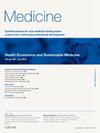一项基于欧洲的横断面研究:家庭医生的精神压力与营养。
IF 1.3
4区 医学
Q2 MEDICINE, GENERAL & INTERNAL
引用次数: 0
摘要
家庭医生是初级医疗保健系统的支柱,他们自身的精神健康与他们的工作表现密不可分。然而,许多研究表明,精神痛苦的发生率很高。造成这一现象的因素包括职业的情感需求、工作负担过重、预算限制、自主权的丧失以及职业价值观的侵蚀。COVID-19 大流行等疫情的爆发会加剧精神压力,因为接触病毒的风险更大、工作时间增加以及担心感染家人。因此,评估风险并提供预防措施至关重要。本研究旨在评估家庭医生的饮食模式与其情绪之间的关联。本研究采用横断面描述法和经过验证的食物-情绪问卷(FMQ),通过社交网络在 10 个欧洲国家共享,收集家庭医生的数据。使用 FMQ 已获得许可。早餐模式分量表的平均得分最高(14.670 ± 4.305)。其他分量表的平均得分如下:健康模式(13.317 ± 5.388)、精神压力模式(11.184 ± 3.824)和西式饮食模式(9.827 ± 3.604)。根据皮尔逊相关检验,早餐与西式饮食模式之间以及早餐与健康模式之间存在正相关。健康与精神压力模式之间呈负相关。有证据表明,精神痛苦可能源于不同的饮食缺陷。医生的营养模式对健康指标有影响,其分布与社会人口因素有关,特别是他们所居住的地区。饮食评估正成为心理健康的一个重要可调节风险因素,但这一领域还需要进一步的研究。本文章由计算机程序翻译,如有差异,请以英文原文为准。
Mental distress and nutrition of family physicians, a European based cross-sectional study.
Family physicians are a pillar of the primary healthcare system, and their own mental well-being is integral to their performance. However, many studies have suggested a high prevalence of mental distress. The contributing factors include the emotional demands of the profession, work overload, budgetary constraints, loss of autonomy, and erosion of professional values. Outbreaks such as the COVID-19 pandemic exacerbate distress due to a greater risk of exposure to the virus, increased working hours, and fear of infecting families. Thus, it is crucial to assess risks and provide preventive measures. This study aimed to evaluate the association between the dietary patterns of family physicians and their mood. This study used a cross-sectional descriptive method and a validated Food-Mood Questionnaire (FMQ), shared via social networks across 10 European countries, to collect data from family physicians. Permission to use the FMQ was obtained. The breakfast-pattern subscale had the highest mean score (14.670 ± 4.305). The other subscale mean scores were as follows: health pattern (13.317 ± 5.388), mental distress pattern (11.184 ± 3.824), and western diet pattern (9.827 ± 3.604). According to Pearson correlation test there was a positive correlation between breakfast and Western diet patterns and between breakfast and health patterns. There was a negative correlation between health and mental distress pattern. Evidence suggests that mental distress may arise from different dietary deficiencies. Physicians' nutritional patterns have an impact on health indicators and are distributed in relation to sociodemographic factors, especially the regions they live in. Diet assessment is becoming a vital modifiable risk factor for mental health, but further research in this field is needed.
求助全文
通过发布文献求助,成功后即可免费获取论文全文。
去求助
来源期刊

Medicine
医学-医学:内科
CiteScore
2.80
自引率
0.00%
发文量
4342
审稿时长
>12 weeks
期刊介绍:
Medicine is now a fully open access journal, providing authors with a distinctive new service offering continuous publication of original research across a broad spectrum of medical scientific disciplines and sub-specialties.
As an open access title, Medicine will continue to provide authors with an established, trusted platform for the publication of their work. To ensure the ongoing quality of Medicine’s content, the peer-review process will only accept content that is scientifically, technically and ethically sound, and in compliance with standard reporting guidelines.
 求助内容:
求助内容: 应助结果提醒方式:
应助结果提醒方式:


